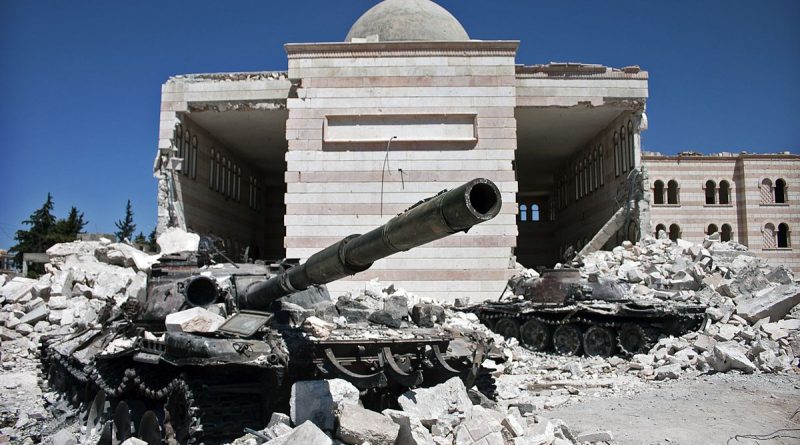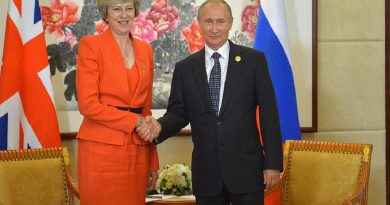Syria in Pieces: Interests, Priorities, and ‘Collateral Damage’
The civil war in Syria is becoming ever so complex and represents a unique example of armed violence in which battles are fought on different levels and against multiple enemies at the same time. This is a country which, only a few years ago, was to become a case of abolishment of an authoritarian regime and introduction into a democracy. However, as a result of pro-democratic forces, it is now entering a phase of total disintegration. This situation can be categorized as a catastrophe for the whole Middle Eastern region, the impact of which will be felt for years in everyday life, without much hope of being overcome.
Assad’s resistance to change
After the breakout of the turmoil – which resulted from the expansion of the so called ‘Arab Spring’ from the territory of Northern Africa to the Middle East – the regime of Bashar al-Assad took a hard hit. Moreover, this is not only because of democratization requests for the country but because of the chaos that befell his army, including many deserters and the formation of various anti-regime groups with an ideology that was yet to be defined. This new Syrian opposition was accepted by the West, which was asking for Assad to abandon his position of power and for the establishment of a new political system made up of all pro-democratic forces.
What might have been surprising to observers is that Assad’s regime and the Syrian army, with large losses, both materialistic and territorial, survived the first wave of pressure, regardless of the fact that the opposition had help in a variety of ways from western countries. The countries in question even tried to create conditions for a united opposition front, which would unite different fractions and would be able to counter the Syrian army.
Russian allies and a new common enemy
Nevertheless, as has happened many times before, the Middle East has proved once again its unpredictability and that any exterior intervention has the potential to entrench complete disorder, instead of leading to a new order of power. In the case where Assad had lost the battle before the Russian Federation had appeared on the scene, with by far more serious interventions (such as the taking of the Crimean territory) the Syrian leader could have already been overthrown.
However, he survived long enough to welcome the arrival of Russian troops that have returned the balance to his side and on a completely different front. To this new situation a significant contribution was made by the military successes of the so called ‘Islamic State’/ISIS, which has – with a presence unseen until that point – brought the interests of the United States and Russia closer together in creating a new list of priorities of which the subversion of Assad has declined in importance.
A shift in priorities
The United States’ decision to decrease the pressure on the regime in Damascus, in order to create a new coalition of countries in the fight against the Islamic State, whether preferred in Washington or not, has turned Bashar al-Assad into an ally. Furthermore, it is due to the fact that he could play a very important role in the destruction of ISIS.
At the same time, the shift of American policy away from the confrontation with Assad, has enabled the Russian Federation to actively participate with others in the battle against ISIS and increased the chances of its defeat without the further involvement of American military troops on the ground.
‘Collateral damage’
The reality in which the Syrian opposition is taking hits from the Syrian army, especially in Aleppo, is unavoidable collateral damage in the wider scheme of the West’s defense against terrorism and the preservation of their interests in the Middle East. Even the constitution of the opposition, which includes groups under the influence of Al-Qaeda, makes the task all the more easy for foreign strategists in holding back from providing any more serious aid. It is as if a message has been sent that the opposition has had its chance and that time has brought a set of new priorities.
What is left as a difficult issue is the contradictory need of the United States to act in Syria and Iraq in the framework of a wide coalition of countries, which includes many Arab and Islamic states. These countries have different goals in the region and act very partially, intending to – even in a chaotic state of all out war -take home whatever they find most appealing. Each group has its own particular interests, internal and external, so it is to be expected that they will legitimately carry out a general war against Islamic radicalism, while at the same time, on the way to victory against ISIS, taking into consideration their particular interests.
Two destroyed tanks in front of a mosque in Azaz, Syria. Photo by Christiaan Triebert / CC BY 2.0
![]() This work is licensed under a Creative Commons Attribution-NonCommercial-ShareAlike 4.0 International License.
This work is licensed under a Creative Commons Attribution-NonCommercial-ShareAlike 4.0 International License.




